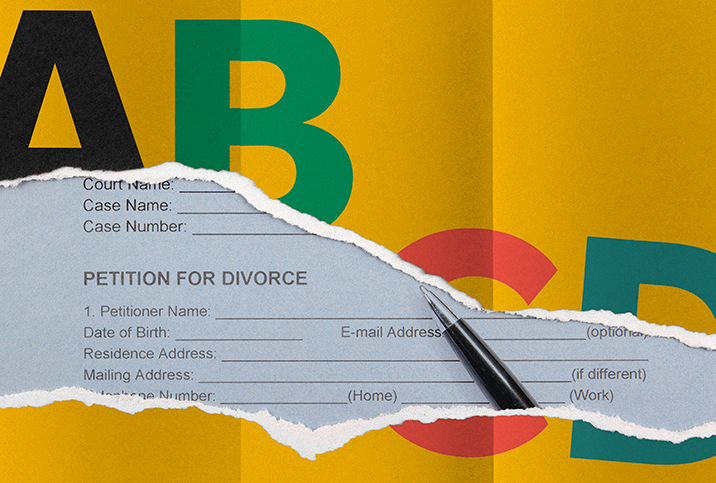Understanding Divorce

Marriage has many ups and downs, but for some couples, no matter how committed they may be, the marriage just doesn't work. When this happens, there are two choices—stay together and try to make it work or split the assets and go it alone. Divorce is a difficult process, but many times, it's the best choice, especially when marital incompatibility is impacting your loved ones, or if you have them, children. Understanding divorce can help make the process smoother and more amicable for both parties.
Overview of divorce
While divorce rates are holding steady in the United States, marriages ending in divorce are lasting longer, and most couples wait until their late 20s to early 30s before getting married. These statistics show that while marriage is still the goal for many adults, it's far more common for couples to put off marriage to ensure the best chances for success, and once couples are married, they try their best to work through the rough patches before getting divorced.
The most commonly cited reason for divorce is a lack of commitment. The next two most common reasons are infidelity and irreconcilable differences. These reasons were also paired with secondary factors such as inability to communicate and inability to work through marital conflicts.
Regardless of how great the marriage may be, if you're reading this article, you've probably recognized some of the key warning signs of a relationship in trouble, such as a constant need for distance, codependency, changing who you are to make your partner happy and/or feeling that the relationship is one-sided. If all of these signs sound familiar, it may be time for a divorce, but there are some important factors to weigh.
What to consider when considering divorce
Divorce, like marriage, is not a choice that should be made in the heat of the moment. A particularly nasty fight or a string of several can have a married couple looking for the exit, but it's essential to sit down and contemplate whether divorce is the right choice. For many couples, the first few years are the hardest. Dating and sharing a life together are very different, and the adjustment takes a sharp learning curve.
Many partners feel they lose their identity after a few years in marriage and struggle to maintain independence while sharing their life with another person. For other couples, the romance dies, and being married feels more like being legally bound to a roommate. When these complications arise, it's important to find the actual source of unhappiness.
Unfortunately, for some marriages, the real problems are much deeper than simple growing pains. Frequent fighting is often a symptom of larger incompatibility. When these disagreements become serious altercations that border on physical, emotional or mental abuse, divorce is the safest solution for everyone involved. Abuse is unacceptable, and once it occurs, it doesn't end.
However, if these fights show potential for resolution, a mediator could help a couple work through the problems. Before hiring a lawyer, consider marriage counseling first. Some states require marriage counseling before accepting a divorce petition, so this may be an essential step to the process. Marriage counseling can make all the difference in the course of the marriage. While some couples confirm that the marriage needs to end, others realize that the bigger issue lies in poor communication skills. Working with a counselor provides a safe space to air grievances and the potential to learn how to listen and validate each other's opinions.
The emotional impact of divorce
If you've tried intervention, even multiple forms of it, and have come to the conclusion that it's time to move on, there's no shame in filing for divorce. Understanding that you and your partner are incompatible is one of the most difficult decisions to make, but it's also one of the most responsible. Getting out of a miserable relationship is the healthiest choice both you and your partner can make.
As you prepare to go through this process with your spouse, it's natural to go through feelings of grief. No matter how short or long the marriage lasted, you are still losing a significant part of your life. Even if the marriage ended in infidelity or became abusive, feeling emotions similar to grieving the loss of a family member is common and should be expected.
It may also feel very lonely, as though no one quite understands the impacts of this process. When the separation is nasty and your partner doesn't want to communicate, this loneliness can feel particularly isolating. To make matters worse, getting a divorce can compromise friendships because your friends may take sides or remove themselves from the situation for fear of creating conflicts in their own marriages.
A counselor can often help to process these events. If you've used a marriage counselor, ask to see this person individually or be referred to another counselor who specializes in divorce counseling. Having an unbiased perspective on this difficult process can help to maintain your mental health and provide necessary coping skills for dealing with your soon-to-be ex-spouse.
What to do when there are children
Divorce is painful enough without children, but when the potential for a major custody battle is part of your separation, this can increase your stress level exponentially. The hardest part is that you must maintain a stable home environment for the children, and no matter how horrible it gets between you and your partner, both of you must never degrade each other in front of your kids.
Maintaining a strong front for the children can be especially hard if turmoil was common in the marriage. However, now that the marriage is over, your children's lives have been turned upside down, and they'll need stability and support from both you and your ex.
Discussing the divorce with your children before you separate can help them process the upcoming changes. It's also important to keep their lives the same in every aspect possible. When deciding custody, most courts will grant custody to the parent who maintains the most stable home life, and this means staying in the same school district and supporting the child's daily extracurricular activities.
Another important consideration is that children of divorce are often more likely to experience divorce themselves. To help counter this statistic, set a good example in your interactions. Some couples actually strategize how to interact in front of their children. Even if you get to the point where you despise one another, remember that you are both extremely important to your children and just because you are incompatible partners does not mean you cannot be effective co-parents.
The worst mistake that ex-spouses make is continuing to fight after the marriage is over. While the road to ending the marriage is rough, at some point you must realize that now that the marriage is done, you don't have to fight anymore. When you have children together, you are tied to this person for the rest of your lives, so why make it more difficult by fighting with each other?
How divorce works
Now that you have accepted the facts, it's time to start the process of filing for divorce and dividing the assets. Understanding this process will help to move things along faster and more seamlessly.
The specific steps of the divorce will depend on where you live. Many states are what's considered “no-fault states.” This means that unless either party can provide substantial evidence of wrongdoing, such as an extramarital affair or abuse of the children or partner, all of the assets owned jointly must be divided equally. This process takes time and often involves a cooling-off period before the initial paperwork can be processed, papers served and a settlement reached in court.
Regardless of the state, it's important to find a lawyer who can help get you through the process. Once you file the paperwork, let your lawyers handle the discussions.
Life after divorce
Divorce is messy and emotional but it also brings new possibilities for a happier life. While ending a marriage can feel like a failure, what it really is is a successful escape from a miserable partnership. Now that you're free to build your own life, take some time to reestablish your goals, find new hobbies, rebuild your daily routine and potentially, open yourself up to a new partnership with someone better suited to you.


















